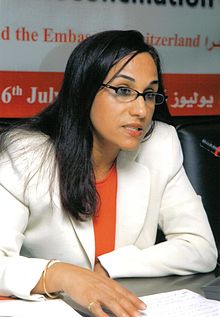
Mohammed VI is King of Morocco. A member of the 'Alawi dynasty,he acceded to the throne on 23 July 1999,upon the death of his father,King Hassan II.
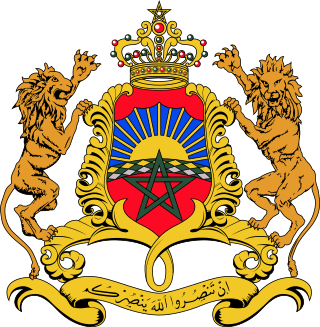
Princess Lalla Meryem is the first daughter and eldest child of the late King Hassan II of Morocco and his wife,Princess Lalla Latifa.
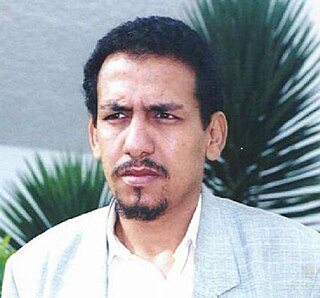
Ali Salem Tamek is a Sahrawi independence activist and trade unionist.
Christine Daure-Serfaty was a French human rights activist and writer who distinguished herself in Morocco where she embraced the fight of the victims of King Hassan II,during the "Years of Lead," and from afar,played a major role in the evolution of the regime and the human rights in Morocco. She was the wife of Abraham Serfaty,a Moroccan dissident. In 1974 Abraham Serfaty was sentenced to life imprisonment. It was in September 1999 that the new Moroccan king,Mohammed VI,permitted Abraham Serfaty’s return to Morocco.

Morocco became a highly repressive country under the absolute monarchy of King Hassan II,and continues to be considered repressive under the reign of King Mohammed VI,though the latter has instituted some reforms. Dozens of journalists,artists,and ordinary citizens are regularly sentenced to lengthy prison sentences for exercising basic rights enjoyed elsewhere in the world,such as freedom of the press,protesting the government,or criticizing government officials. Morocco heavily restricts basic human rights,such as freedom of speech,the right to assembly,and the right to criticize officials. Moroccans also feel the pressures of inflation within the country,such as the lack of basic services like healthcare,clean water,and the difficulty of parents to access quality education for their children. While there have been a handful of reforms that have been generally welcomed internationally,most Moroccans feel this is insufficient,and continue to be unhappy with the trajectory of the country under the policies of King Mohammed VI,despite his transition of the government to an ostensible constitutional monarchy. Under his father,King Hassan II,Morocco had one of the worst human rights records in Africa and the world,especially during the time period known as the "Years Of Lead",which lasted from the early 1960s until the late 1980s;it was a period in the country's history that was known for the brutal repression of political dissent and opposition,that involved wide-scale arrests,arbitrary detention,lengthy imprisonment,and even killings of political opponents. Currently,Morocco continues to face some of these issues,as well as other human rights problems,such as poor prison conditions,the mistreatment of women and the LGBT community,and the widespread use of torture by police. Despite the considerable improvements made in the last several years under the leadership of King Mohammed VI,who has rolled back some of his father's harshest decrees,repression of political dissidence,and torture of citizens by officials,is still commonplace in Morocco today.
The Years of Lead was a period of the rule of King Hassan II of Morocco,from roughly the 1960s through the 1980s,marked by state violence and repression against political dissidents and democracy activists.
Princess Lalla Amina was a member of the Moroccan royal family and former President of the Royal Moroccan Federation of Equestrian Sports.
Omar Azziman,is an advisor to Mohammed VI,King of Morocco.
Ali Oumlil is a Moroccan philosopher,thinker,human rights activist,diplomat and political persona.

Nasser Zefzafi is a Moroccan political activist and human rights activist. Known as the "Moroccan Gandhi" or "Moroccan Pasionaria" for his nonviolent protests,Zefzafi has been described as the leader of the popular resistance movement organized in the Rif in 2016–2017 as Hirak Rif.

The Hirak Rif Movement or the Rif Movement is a popular resistance movement that organised mass protests in the Berber Rif region in northern Morocco between October 2016 and June 2017. The movement was triggered by the death of Mouhcine Fikri,a fishmonger who was crushed to death after jumping in the back of a garbage truck attempting to retrieve his allegedly illegal fish merchandise confiscated by local authorities.
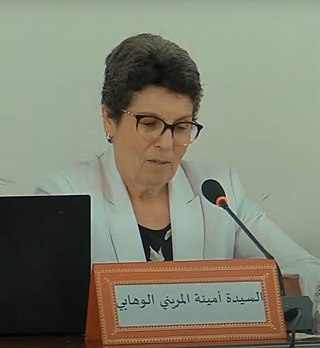
Amina Lemrini El Ouahabi is a Moroccan human rights activist,and the president of Morocco's Haute Autoritéde la communication audiovisuelle.
Latifa El Bouhsini is a university professor at the Faculty of Education Sciences in Rabat,and has been a member of the National Office of the School of Citizenship for Political Studies,ECEP,in Rabat since 2012. Bouhsini is also a member of the national office of the Moroccan Organization of Human Rights She is a writer and a leftist feminist activist who holds a PhD in history and civilizations and writes prolifically about the history of the feminist movement in Morocco. Bouhsini is also a trainer specialized in gender and women's rights,and she is a speaker at the National Human Rights Council.

The Second Arab Spring is a series of anti-government protests which took place in several Arab world countries from late 2018 onwards.
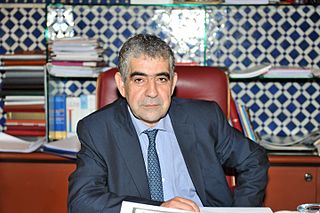
Driss el-Yazami is a Moroccan human rights activist. He was President of the National Council of Human Rights (CNDH) in Morocco between March 2011 and December 2018.
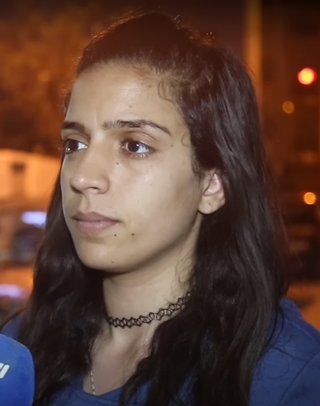
Salima Ziani also known as Silya is a Moroccan singer-songwriter,human rights activist,feminist,and ex-political prisoner. She was born and grew up in the Afzar neighborhood of Al Hoceima. She later moved to Imzouren,in the Rif Region,where she's originally from. She is the youngest of six siblings:four sisters and two brothers.

Omar Radi is a Moroccan investigative journalist and human rights activist. He has worked at Lakome,Atlantic Radio,Media 24,TelQuel and Le Desk and volunteered for the citizen media Mamfakinch,focusing on investigations about human rights,corruption and social movements. He was detained in Casablanca on 26 December 2019 for criticizing a judge in a tweet posted six months earlier. His arrest triggered a movement of solidarity among his sympathizers. He was handed a suspended four-month prison sentence,a verdict criticized by some NGOs and human rights groups.
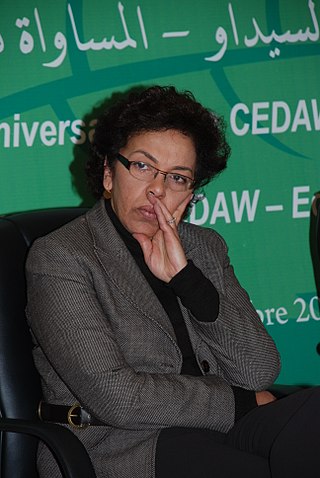
Rabéa Naciri is a Moroccan human rights activist and expert on gender and women's rights in Morocco. She is a founding member of the Democratic Association of Moroccan Women (ADFM),a human rights non-governmental organization,that has been described as the "cornerstone of feminism in Morocco".
Khadija Marouazi is a Moroccan human rights activist,writer and university lecturer for literature. Member of several human rights organizations in Morocco,she is also known for her debut novel History of Ash, originally written in Arabic and published in English translation in 2023. This fictional account of political repression during the so-called Years of Lead in Morocco and the traumatic effects on prisoners has been discussed by literary scholars as part of Arab women writers' prison literature.
The Riffian independence movement is an ongoing political movement aiming for international recognition of the Rif region in Northern Morocco,as a state independent from the Kingdom of Morocco. The movement is rooted in several instances of indigenous territory being colonized,ruled,and marginalized by different powers and the riots and civil disobedience resulting from it,including the 1958 Rif riots and the Hirak Rif movement. While Riffian independence has been a topic of protest and organization in the past,the formal and internationally noted independence movement could technically be considered to have begun in September 2023 with the formation of the Rif Nationalist Party (PNR).
